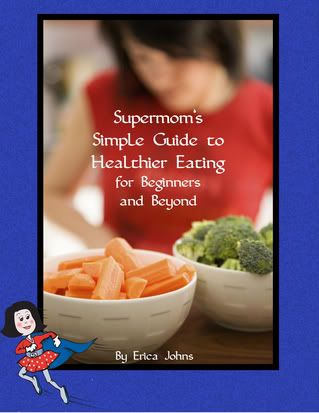This question was asked of me today, and I thought I would share with you all the ideas I had on the subject:
I think that affording healthy food is a concern that most people have. For us, I guess it has been gradual both in finding resources and ways to make it less expensive, and also getting used to what we do spend.
For instance, years ago I found a co-op locally and I was able to get bulk amounts of organic brown rice, beans, etc. and it actually ended up being comparable or even cheaper than non-organics. Yes, I have to buy 20 pounds or so at a time, but we got used to it. After a few months of buying 1-3 items, I was stocked for a long time.
I try to follow the Dirty Dozen and Clean 15 guidelines to decide what's most important to buy organic and what I can more safely buy non-organic. There are still things that I do not feel are affordable yet for us to switch to organic, so I just carry on with my philosophy of "do what you can, when you can."
Kroger has a good selection of natural and organic foods that gets marked down regularly. I commonly get organic spinach and salad mixes that are marked down, reasonably priced organic apples, organic milk marked down to less than what regular milk is selling for (I make yogurt every week), for the last several weeks the Kashi Organic Promise cereals were on sale for $2.99 per box, but there were $1 coupons on the boxes, so they were $1.99/box. I stocked up bigtime on those. Kroger brand pasta and crackers are often available in whole wheat and is inexpensive. We don't love the whole wheat pasta plain, but when adding it to a soup or casserole, we don't notice any difference at all.
I have gradually gone to making more things from scratch. This makes healthy food cheaper and of course you can control the ingredients. Even if you want to make cookies, you can use whole wheat flour or oatmeal, make sure there is no lard or high fructose corn syrup, etc. It may not be "perfect" but it's a whole lot better than 30 chemical ingredients added to the cookies at the store bakery.
Gradually learning more homemade cooking skills pays off in the end. I make yogurt every week in my crock pot. It is extremely easy, no fuss, very cheap, and far better than what I could buy in the store. So, I get a better product for far less money. My mom is a very busy person and she has one afternoon a week where she does food prep for the entire week ahead. A few hours invested allows her to save money, save time, and have the ability to eat healthfully. You can hear the interview that I did with her last year and get some great ideas from her here.
(We were having some technical issues during the first minute, so hang in there as you're listening, until you get into the interview.)
As I have learned more things about food and health, there are some things I just don't consider food and would not consider buying to eat, no matter how cheap it is. When you remove a lot of junk items, snack foods, etc. there is money for other items.
I know we're sometimes "guilty" of this, but a lot of times people feel like their grocery budget can't budge, but they manage to go out to eat pretty often. If people put the cost of one meal at a restaurant into the grocery budget, right there is a pretty good chunk of money to eat healthier with! Depending on how many times a family eats out or chooses to put that money elsewhere, choosing to spend differently can make a huge difference for grocery money.
Some families spend a lot of money for their TV service, but maybe that is an area where they could cut back for something more important to them. We have no TV service in our home at all. (and we have survived this way for most of the nearly 19 years we have been married) We do have a TV and do watch videos, and we can watch many shows online. I cannot imagine spending $40-90+ a month on dish, satellite, or cable TV like many people do. I enjoy having less noise clutter, fewer distractions for everybody, and no TV in the living room or most other areas of the house. I think our children are better off without TV, and I know I am. (TV is a constant temptation for me, so it is better for me to just not have it at all)
I will give you a real-life scenario I have been thinking about: I use frozen strawberries and blueberries in my smoothies most days. Both are on the Dirty Dozen list, so ideally I should be buying organic. Initially I wasn't because I did not have convenient access to organic berries. Now they are available at my store, though they are 2-3 times more expensive than what I buy now. I did not jump in right away and decide to do it, because for probably 25 days of smoothies per month, that is a significant amount of money in berries if I switch to organic. I have been watching what I do buy, and have noticed where I could afford to buy less of some things that are not really beneficial to our health (nor filling), and put that money toward the organic berries. I could choose to buy some of our berries organic and some conventional and just let it be an improvement. I could also choose to drink (and serve) smaller smoothies. I'm not exactly sure where we will be on this in a month. Our grocery budget seems to have increased greatly as our littler boys have started growing fast and eating even faster. My youngest boy is always asking for a snack (and he likes healthy ones, too) and he will grin and say, "Well you always tell me I'm a bottomless pit!" :) He sure is! But his snacks and meals are healthy, he gets lots of exercise and fresh air, and he is in no way overweight. He just needs a lot of food these days.
Then multiply that by 4, to include the other little boys. :)
We're spending more than ever on groceries, and I don't see an end in sight. It's normal to have limits, and to do what you can within those limits. Do what you can, when you can, and try not to "sweat" the difference. (but you are allowed to strategize about how to get to the next goal)
What do you think? How do you afford healthier food?
Subscribe to:
Post Comments (Atom)










No comments:
Post a Comment